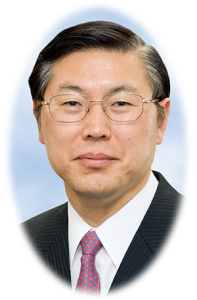
Eiji Tokuno, Chairman of the International Highway Foundation, gave a lecture in Saga City on March 29, 2014.
I will post excerpts from the lecture.
—–
“Japan-Korea Tunnel Project for Peace in Northeast Asia”
- Examining the realization of the Japan-Korea Tunnel from seven perspectives -
First, I would like to congratulate you on the formation of the Japan-Korea Tunnel Saga Prefectural Council.
Today, I would like to discuss the significance of the Japan-Korea tunnel from seven perspectives in order to make it a reality.
The first is the issue of love for humanity.
This Japan-Korea tunnel/international highway concept was proposed in 1981 by Rev. Sun Myung Moon, the founder of the unification movement. The most fundamental way of thinking can be summed up in one word: love for humanity. Unless this spirit is followed, in the true sense of the word, it will be impossible to realize the Japan-Korea Tunnel and International Highway, which goes beyond national interests. This is because if Japan and South Korea only consider their national interests, there will always be a conflict somewhere. The only way to overcome this is to change our way of thinking. How much money do humans spend on wars and military expenses? This time, we will use those funds for world peace, transcending the walls of national interests, borders, and nationalism. Unless we come up with this kind of idea, it will be difficult to realize the Japan-Korea tunnel and international highway.
Despite all that has happened in the past, Japan and South Korea co-hosted the World Cup in 2002, and it was a great success. In 2018, Japan fully supported the Winter Olympics in Pyeongchang, and South Korea fully supported the 2020 Tokyo Olympics, and by making the Olympics a success together, we hope that the sentiment between Japan and Korea will further strengthen. It gets closer. I am convinced that if we do that, the problem of tunnels will no longer be a big problem.
The second goal is to "level up technology and industry" between Japan and Korea through "exchanges of people, goods, and culture."
Furthermore, by creating an international highway, technology and industry will spread throughout Asia and the rest of the world, allowing for balanced development.
The third is "effective use of energy and resources."
With the realization of the Japan-Korea Tunnel and International Highway, a fully equipped transportation system will be able to be used effectively.
The fourth issue is human resources and economic effects.
Even if you look only at East Asia, it is huge.
China's population is 1.35 billion. Also, if we consider the Korean Peninsula, including the north and south, the total is 70 million. Japan has 120 million human resources, and this alone has over 1.5 billion human resources. India currently has over 1 billion people and is expected to reach 1.47 billion by 2027. Just by realizing this Japan-Korea tunnel, a huge economic zone will be created. By the way, I would like to tell you that it is possible to create an economic zone with a radius of 500 km around Tosu. Therefore, I would like to state that the economic effects of the Japan-Korea tunnel have unlimited potential.
The fifth is technical ability.
If we take advantage of Japan's current technological capabilities, the Japan-Korea tunnel and the international highway are completely possible. I also believe that Japan's technological capabilities can be further improved as the international highway progresses.
Sixth, by realizing the Japan-Korea Tunnel, we will be able to create a Rim-Japan Sea Economic Zone.
This story is great news for the people of Hokuriku and Tohoku. The Sea of Japan side is directly connected to Russia, South Korea, and North Korea. In that sense, I think this can predict the arrival of a new era.
The seventh issue is the issue of national sentiment and public opinion in Japan and South Korea.
What I would like to say here is that through tourism, cultural exchange, and mutual cooperation in the Olympics, Japan and South Korea have become ``near and close'' peoples who are as close as they were before, if not more so than before, and international marriage between Japan and South Korea has become natural. National sentiment will be heightened by more formal exchanges and more frequent exchanges between Japan and South Korea. And naturally, the Japan-Korea tunnel and international highway are commonplace! If we can create such an atmosphere, we are confident that it will become a reality.
—–
Excerpts from the lecture can be downloaded in PDF format.
